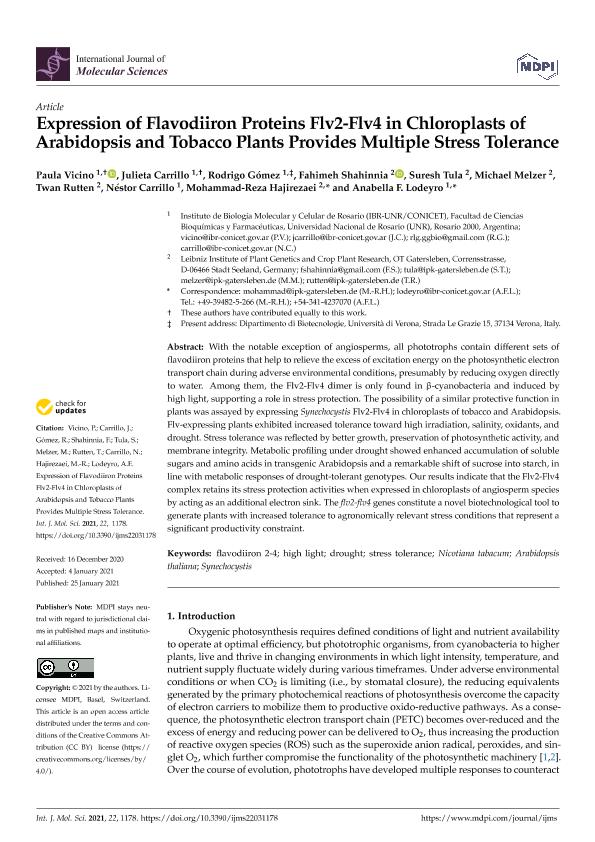Mostrar el registro sencillo del ítem
dc.contributor.author
Vicino, Paula

dc.contributor.author
Carrillo, Julieta Beatriz

dc.contributor.author
Gomez, Rodrigo Lionel

dc.contributor.author
Shahinnia, Fahimeh
dc.contributor.author
Tula, Suresh
dc.contributor.author
Melzer, Michael
dc.contributor.author
Rutten, Twan
dc.contributor.author
Carrillo, Nestor Jose

dc.contributor.author
Hajirezaei, Mohammad Reza
dc.contributor.author
Lodeyro, Anabella Fernanda

dc.date.available
2023-01-25T12:43:54Z
dc.date.issued
2021-02
dc.identifier.citation
Vicino, Paula; Carrillo, Julieta Beatriz; Gomez, Rodrigo Lionel; Shahinnia, Fahimeh; Tula, Suresh; et al.; Expression of Flavodiiron Proteins Flv2-Flv4 in Chloroplasts of Arabidopsis and Tobacco Plants Provides Multiple Stress Tolerance; MDPI AG; International Journal of Molecular Sciences; 22; 3; 2-2021; 1-21
dc.identifier.issn
1422-0067
dc.identifier.uri
http://hdl.handle.net/11336/185511
dc.description.abstract
With the notable exception of angiosperms, all phototrophs contain different sets of flavodiiron proteins that help to relieve the excess of excitation energy on the photosynthetic electron transport chain during adverse environmental conditions, presumably by reducing oxygen directly to water. Among them, the Flv2-Flv4 dimer is only found in β-cyanobacteria and induced by high light, supporting a role in stress protection. The possibility of a similar protective function in plants was assayed by expressing Synechocystis Flv2-Flv4 in chloroplasts of tobacco and Arabidopsis. Flv-expressing plants exhibited increased tolerance toward high irradiation, salinity, oxidants, and drought. Stress tolerance was reflected by better growth, preservation of photosynthetic activity, and membrane integrity. Metabolic profiling under drought showed enhanced accumulation of soluble sugars and amino acids in transgenic Arabidopsis and a remarkable shift of sucrose into starch, in line with metabolic responses of drought-tolerant genotypes. Our results indicate that the Flv2-Flv4 complex retains its stress protection activities when expressed in chloroplasts of angiosperm species by acting as an additional electron sink. The flv2-flv4 genes constitute a novel biotechnological tool to generate plants with increased tolerance to agronomically relevant stress conditions that represent a significant productivity constraint.
dc.format
application/pdf
dc.language.iso
eng
dc.publisher
MDPI AG

dc.rights
info:eu-repo/semantics/openAccess
dc.rights.uri
https://creativecommons.org/licenses/by/2.5/ar/
dc.subject
ARABIDOPSIS THALIANA
dc.subject
DROUGHT
dc.subject
FLAVODIIRON 2-4
dc.subject
HIGH LIGHT
dc.subject
NICOTIANA TABACUM
dc.subject
STRESS TOLERANCE
dc.subject
SYNECHOCYSTIS
dc.subject.classification
Bioquímica y Biología Molecular

dc.subject.classification
Ciencias Biológicas

dc.subject.classification
CIENCIAS NATURALES Y EXACTAS

dc.title
Expression of Flavodiiron Proteins Flv2-Flv4 in Chloroplasts of Arabidopsis and Tobacco Plants Provides Multiple Stress Tolerance
dc.type
info:eu-repo/semantics/article
dc.type
info:ar-repo/semantics/artículo
dc.type
info:eu-repo/semantics/publishedVersion
dc.date.updated
2022-09-19T16:04:17Z
dc.journal.volume
22
dc.journal.number
3
dc.journal.pagination
1-21
dc.journal.pais
Suiza

dc.description.fil
Fil: Vicino, Paula. Consejo Nacional de Investigaciones Científicas y Técnicas. Centro Científico Tecnológico Conicet - Rosario. Instituto de Biología Molecular y Celular de Rosario. Universidad Nacional de Rosario. Facultad de Ciencias Bioquímicas y Farmacéuticas. Instituto de Biología Molecular y Celular de Rosario; Argentina
dc.description.fil
Fil: Carrillo, Julieta Beatriz. Consejo Nacional de Investigaciones Científicas y Técnicas. Centro Científico Tecnológico Conicet - Rosario. Instituto de Biología Molecular y Celular de Rosario. Universidad Nacional de Rosario. Facultad de Ciencias Bioquímicas y Farmacéuticas. Instituto de Biología Molecular y Celular de Rosario; Argentina
dc.description.fil
Fil: Gomez, Rodrigo Lionel. Consejo Nacional de Investigaciones Científicas y Técnicas. Centro Científico Tecnológico Conicet - Rosario. Instituto de Biología Molecular y Celular de Rosario. Universidad Nacional de Rosario. Facultad de Ciencias Bioquímicas y Farmacéuticas. Instituto de Biología Molecular y Celular de Rosario; Argentina
dc.description.fil
Fil: Shahinnia, Fahimeh. Leibniz Institute Of Plant Genetics And Crop Plant Research; Alemania
dc.description.fil
Fil: Tula, Suresh. Leibniz Institute Of Plant Genetics And Crop Plant Research; Alemania
dc.description.fil
Fil: Melzer, Michael. Leibniz Institute Of Plant Genetics And Crop Plant Research; Alemania
dc.description.fil
Fil: Rutten, Twan. Leibniz Institute Of Plant Genetics And Crop Plant Research; Alemania
dc.description.fil
Fil: Carrillo, Nestor Jose. Consejo Nacional de Investigaciones Científicas y Técnicas. Centro Científico Tecnológico Conicet - Rosario. Instituto de Biología Molecular y Celular de Rosario. Universidad Nacional de Rosario. Facultad de Ciencias Bioquímicas y Farmacéuticas. Instituto de Biología Molecular y Celular de Rosario; Argentina
dc.description.fil
Fil: Hajirezaei, Mohammad Reza. Leibniz Institute Of Plant Genetics And Crop Plant Research; Alemania
dc.description.fil
Fil: Lodeyro, Anabella Fernanda. Consejo Nacional de Investigaciones Científicas y Técnicas. Centro Científico Tecnológico Conicet - Rosario. Instituto de Biología Molecular y Celular de Rosario. Universidad Nacional de Rosario. Facultad de Ciencias Bioquímicas y Farmacéuticas. Instituto de Biología Molecular y Celular de Rosario; Argentina
dc.journal.title
International Journal of Molecular Sciences

dc.relation.alternativeid
info:eu-repo/semantics/altIdentifier/url/https://www.mdpi.com/1422-0067/22/3/1178
dc.relation.alternativeid
info:eu-repo/semantics/altIdentifier/doi/http://dx.doi.org/10.3390/ijms22031178
Archivos asociados
